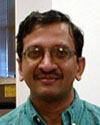 |
Plenary Talk 2
Sparse Signal Recovery: Theory, Applications and Algorithms
Bhaskar Rao
University of California at San Diego
Download Slides
Monday, June 22nd
14:00 - 15:00
Teatro del Pavone
Abstract
The problem of sparse signal recovery has received much attention recently with the development of compressed sensing. The underlying principles have general applicability and provide new and valuable tools to the practicing signal processing engineer. In this talk, we provide an overview of sparseness constraint in signal processing. It has many potential signal processing applications such as efficient signal representation, sparse channel estimation and MEG/EEG analysis, among others which serve to motivate this area. This talk will address the challenges underlying the sparse signal recovery problem, namely the problem of computing the sparsest solution to an undetermined linear system of equations. Unfortunately, the associated optimization problem is computationally complex (NP-hard) motivating the search for suboptimal algorithms, which offer a reasonable compromise between complexity and performance. In particular we will discuss two classes of methods: One based on minimizing diversity measures such as the FOCUSS algorithm and l1 minimization and the other based on sparse Bayesian learning (SBL). In addition to discussing the computational algorithms, we will examine theoretical challenges such as the ability of the algorithms to identify the true sparse solution.
Biography
 Bhaskar D. Rao (S’80 - M’83 - SM’91 - F’00) received the B.Tech. degree in electronics and electrical communication engineering from the Indian Institute of Technology, Kharagpur, India, in 1979 and the M.S. and Ph.D. degrees from the University of Southern California, Los Angeles, in 1981 and 1983, respectively. Since 1983, he has been with the University of California at San Diego, La Jolla, where he is currently a Professor with the Electrical and Computer Engineering Department and holder of the Ericsson endowed chair in wireless access networks. His interests are in the areas of digital signal processing, estimation theory, and optimization theory, with applications to digital communications, speech signal processing, and human-computer interactions. Bhaskar D. Rao (S’80 - M’83 - SM’91 - F’00) received the B.Tech. degree in electronics and electrical communication engineering from the Indian Institute of Technology, Kharagpur, India, in 1979 and the M.S. and Ph.D. degrees from the University of Southern California, Los Angeles, in 1981 and 1983, respectively. Since 1983, he has been with the University of California at San Diego, La Jolla, where he is currently a Professor with the Electrical and Computer Engineering Department and holder of the Ericsson endowed chair in wireless access networks. His interests are in the areas of digital signal processing, estimation theory, and optimization theory, with applications to digital communications, speech signal processing, and human-computer interactions.
His paper received the best paper award at the 2000 speech coding workshop and his students have received student paper awards at both the 2005 and 2006 International conference on Acoustics, Speech and Signal Processing conference as well as the best student paper award at NIPS 2006. A paper he co-authored with B. Song and R. Cruz received the 2008 Stephen O. Rice Prize Paper Award in the Field of Communications Systems. He also received the graduate teaching award from the graduate students in the Electrical Engineering department at UCSD in 1998. He was elected to the fellow grade in 2000 for his contributions in high resolution spectral estimation. Dr. Rao has been a member of the Statistical Signal and Array Processing technical committee, the Signal Processing Theory and Methods technical committee as well as the Communications technical committee of the IEEE Signal Processing Society. He currently serves on the editorial board of the EURASIP Signal Processing Journal.
|
 |

